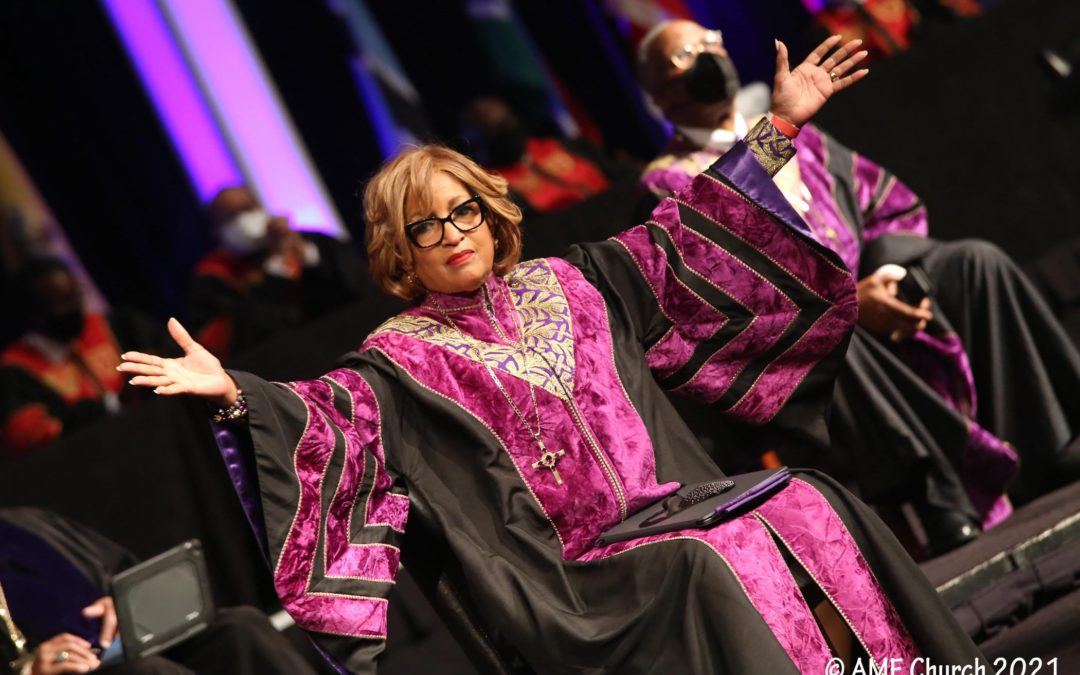
by Adelle M. Banks, RNS | Jul 21, 2021 | Black History, Commentary, Headline News |
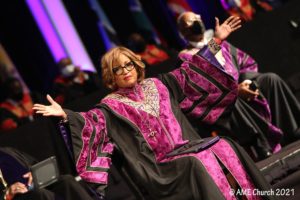
(RNS) — Just-retired Bishop Vashti Murphy McKenzie is an apologist for an adaptive style of leadership. It’s what has helped her succeed as the first woman to hold many roles in the African Methodist Episcopal Church. And it’s a style of leadership she said was needed during the pandemic.
“Adaptive leadership means that you are faced with situations but do not have a solution or answer that comes from past experiences, so you have to adapt,” she said in an interview on Thursday (July 15), a week after her retirement began at the close of her denomination’s General Conference in Orlando, Florida.
“You have to know how to pivot, you have to step back, get on the balcony, survey the scene, throw out what you know or what you think you know and then find the answer that’s going to fit this issue right here.”
McKenzie, who remains the national chaplain of the Delta Sigma Theta sorority, acknowledged this approach appeals to her because that’s the way she’s lived her life as a female trailblazer in her 205-year-old denomination. In 2000, McKenzie was the first woman elected bishop and later the first to serve as president of its Council of Bishops and chair of the General Conference Commission, which organizes the denomination’s quadrennial meeting.
Now one of five women bishops elected in the AME Church, McKenzie remains ready to answer anyone who questions their ability to lead.
“Do I think women can do this? Yes,” she said. “Do I think women are called to this? Yes. Do I think the women that have been elected in my denomination have done an exceptional job? Absolutely.”
As she led AME regional districts in Africa, Tennessee and Texas, McKenzie said she focused on her work rather than her title, letting the results speak for themselves. She modeled holding babies with AIDS to show it was safe and proved it was worthwhile to develop church websites to help attract new members and it was practical to use golf tournaments as fundraisers for church projects and seminary scholarships.
As she spoke at the conclusion of the General Conference bishops’ retirement service on July 9, she thanked her husband, former NBA guard Stan McKenzie (the first male episcopal supervisor of missionary work in the AME Church), her denomination and God for their support.
“What God did for me is evidence of what God can do for you,” she said. “For if God could do this, God can do what God promises you. That can be done no matter who says it can’t be.”
McKenzie, 74, talked with Religion News Service about her journey as a female bishop, those who paved the way for her to reach that role, and what’s next for her and for her denomination.
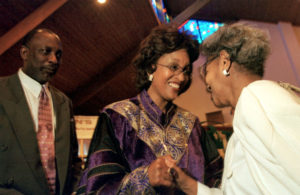
Bishop Vashti Murphy McKenzie, center, outgoing pastor of Payne Memorial African Methodist Episcopal Church in Baltimore, bids longtime member Helen Thorton farewell on her last Sunday at the church in Sept. 2000. At left is her husband, Stan McKenzie. Photo by Carl Bower
The interview has been edited for length and clarity.
Looking back as the first woman bishop of the African Methodist Episcopal Church, is there a way you would sum up your experience since 2000?
Being the first of anything, there is no book. There is no DVD. There’s no movie. There’s nobody in front of you, to be able to share back experiences of what it’s going to look like and feel like and be like and so you’re charting your own way. And as people receive you — not only as you are in your position but also receive you as a human being — and begin to see you have something to bring to the table and be able to embrace the uniqueness of my femininity. I do what bishops have to do, but I don’t do them in the same way because I’m Vashti.
Your family has long been in the journalism business, running the Afro American newspaper chain. You wrote newspaper articles starting at age 16 and as bishop you oversaw denominational publications including The Christian Recorder. What was it like to move from being in the news business to becoming a newsmaker?
It was a little bit different being on the other side of the microphone, the other side of the camera and on the other side of the notepad, really, because I grew up telling some other people’s stories. And then the shift comes where then you become the story. And so, my intention was not to have my episcopal career be about me. That my episcopal career would be about the people I serve. So I was intentional, to focus on the work, rather than the first. God didn’t just call me to be first. God called me to do the work. And so that’s what I focused on in each of the districts I served.
You mentioned in the “Echoes from the General Conference” documentary that, though 2000 was a turning point for women bishops, it was preceded by earlier actions. What and/or who paved the way?
Well, many, many women. Many women whose names were not written, who did not get a footnote, who were in the margins. Faces and names people have forgotten a long time ago. Beginning with Jarena Lee. Jarena Lee stood at her time, when Bishop Richard Allen says he’s not going to license women. But God created an opportunity and she stood, and so then off she goes to walking and preaching hundreds of miles.
Elizabeth Scott ran for the episcopacy for many, many, many years. The women who were appointed presiding elders, the women who were appointed pastors, and did fabulous work because if they didn’t, then they would never give another woman a chance.
The 2021 episcopal address, the message of the bishops to the denomination during the General Conference, spoke of longtime struggles for women to gain ordination, and the rank of bishop. What action do you think is needed still?
What seems to be difficult for the church at large — and I’m talking about the universal church, denominations at large — is the inability of embracing inclusivity, as far as women is concerned. Just because you’re at the table, doesn’t mean it’s success for all women. Just because there’s one presiding elder, one woman who is a bishop, doesn’t mean the playing field is level for all women. And so in order for that to happen, we have to be intentional, and intentional means you don’t promote or assign just because a woman is a woman. You recognize her gifts. When I ran, I didn’t run on a platform saying elect me because I’m a woman. I ran on a platform that says elect me because I’m qualified.
Was there something you’re particularly proud of achieving in ecumenical or interfaith circles?
Most of my ministry is focused within the AME Church but I preach everywhere. I have preached for the Presbyterian women, the Baptist women. I preached for the Hampton (University) Ministers’ Conference with denominations from all over, for the United Methodist Church, for the United Methodist annual conferences. And in that way, sharing prophetically also helps to shape people’s embracing women. I have preached at Catholic churches. I have spoken in Jewish communities.
I have preached in seminaries, and it’s so important for the female seminarians to be able to see someone who is their same gender, who has the same kind of uniqueness, as an encouragement to see the broader picture, to see ministry beyond your own front door.
The AME Church has voted to start an ad hoc committee on LGBTQ matters. Do you think it may be turning a corner about acceptance of LGBTQ people, just as the denomination turned a corner on women bishops 21 years ago?
I think dialogue is going to be good for the church because there are different people in different places having different kinds of conversations and to be able to have open conversation, which an ad hoc committee would provide, where the church is gathered, will be healthy and may be helpful.
Do you see an end to the ban on same-sex marriage?
I think we’re going to have to wait and see the conversation, the power of the conversation. I just think it’s just too hard to predict at this moment. We have to remember the church, the broader church, has a hard time dealing with racism. Church, period, had a hard time dealing with sexism. They have a hard time dealing with agism, classism. And now, this is the next wrestle. And after this wrestle, there’ll be another, and there’ll be another, and there’ll be another, and there’ll be another.
So now that you have reached retirement as an AME bishop, what’s next for you?
I’m going to continue with Selah (Leadership Encounters for Women, her professional women’s empowerment organization) because I have a passion for leadership. I plan to write. This is a good time to sit down and put some thoughts down on paper. And then, as they say, we’ll look into the horizon to see what also is next.
This story has been corrected to clarify that the African Methodist Episcopal Church has a ban on same-sex marriage. It does not have a ban on ordination of LGBTQ persons.
by Allen Reynolds, UrbanFaith Editor | Jul 18, 2021 | Commentary, Prayers & Devotionals |
 Summer is in full swing, and people all across the country have fired up their grills, purchased their summer wardrobes, and started traveling. For Black folks, summer often means family reunions (especially after the pandemic lockdown), barbecues (cookouts/kickbacks/get-togethers/BBQs), and finding things for the kids to do (like sports, activities, or playing outside). We all look forward to summer vacations, summer hours, and summer…denominational general conferences?
Summer is in full swing, and people all across the country have fired up their grills, purchased their summer wardrobes, and started traveling. For Black folks, summer often means family reunions (especially after the pandemic lockdown), barbecues (cookouts/kickbacks/get-togethers/BBQs), and finding things for the kids to do (like sports, activities, or playing outside). We all look forward to summer vacations, summer hours, and summer…denominational general conferences?
For whatever reason (probably the pandemic), 2021 has been the year of many denominational general conferences when the saints of God have gathered together to elect new leadership, hear inspiring teaching, and debate church policy. Some people are not looking forward to these conferences every few years, and many believers don’t even know they are happening. A lot of us don’t even have denominations to host conferences, and we’re fortunate if our church leadership gets together with other leaders to decide how to more effectively love God and love people.
But more than ever, people are actually hearing about these conferences, usually because of controversy. We have heard everything from debates about same sex marriage to whether systemic racism is real. We have seen rejoicing and anxiety over the appointment of new leaders, reports of how to handle abuse and instructions on how to handle finances. And many Christians ask, why are we having these conferences? Why are these issues being debated? Why aren’t we just doing what the Bible says?
 Well, we are actually doing exactly what the Bible says. The Bible is where we find the church resolving debates over contemporary issues and developing administration together in Acts 6, the commissioning of Barnabas and Paul (Saul) in Acts 13, and the first church-wide conference at Jerusalem in Acts 15. At that conference, the Gospel was articulated for Gentiles. Plus, we see Apollos teaching right doctrine after meeting with Priscilla and Aquila in Acts 18. There is no law in scripture for every situation, especially as the world changes and God continues calling us to follow Him. We need a relationship with God and the power of the Holy Spirit to lead us into all truth. It was the Pharisees and Sadducees who believed they could keep the letter of the law perfectly and had no need for God’s Spirit to lead them.
Well, we are actually doing exactly what the Bible says. The Bible is where we find the church resolving debates over contemporary issues and developing administration together in Acts 6, the commissioning of Barnabas and Paul (Saul) in Acts 13, and the first church-wide conference at Jerusalem in Acts 15. At that conference, the Gospel was articulated for Gentiles. Plus, we see Apollos teaching right doctrine after meeting with Priscilla and Aquila in Acts 18. There is no law in scripture for every situation, especially as the world changes and God continues calling us to follow Him. We need a relationship with God and the power of the Holy Spirit to lead us into all truth. It was the Pharisees and Sadducees who believed they could keep the letter of the law perfectly and had no need for God’s Spirit to lead them.
In the Old Testament, we read that before any major decisions were made, the kings of Israel sought wise counsel–not just as advice–but as wisdom from collaboration. The prophets, priests, and advisors would weigh in, and they would all pray to receive God’s wisdom for leadership. In the New Testament, we read that the apostles and elders were accountable to the community of believers and met together to pray and seek God’s guidance and receive instruction for the churches they led. None of these people were perfect.n the contrary, God met them with wisdom in the midst of their flaws.
We should continue to value church conferences and approach them with honor and hope. We cannot take for granted that many believers across the world cannot gather together publicly in general, let alone in large conferences. We should embrace and celebrate our opportunities to do so. If God was able to show up with wisdom for believers in the Bible, we know that despite our flaws and problems, God can show up for us with wisdom as well.
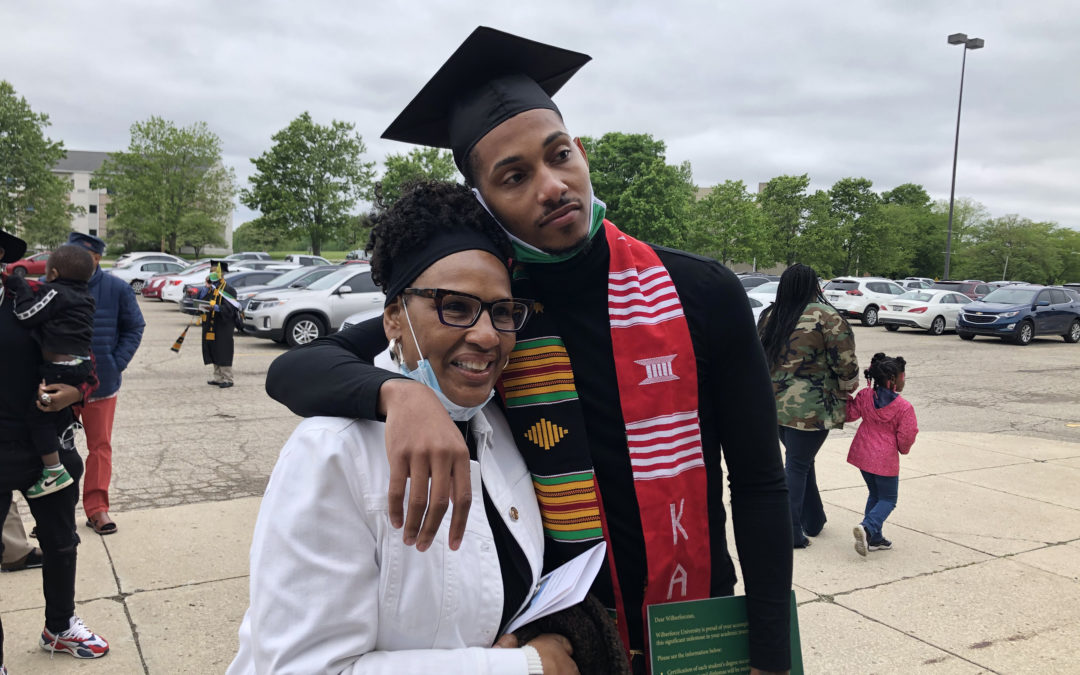
by Adelle M. Banks, RNS | Jun 8, 2021 | Headline News |
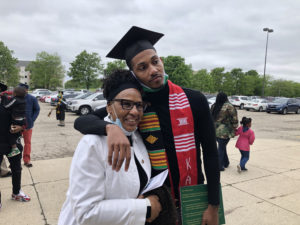
Rodman Allen hugs his mother after the 2021 Wilberforce University Commencement, Saturday, May 29, 2021, in Wilberforce, Ohio. Courtesy photo
(RNS) — There are usually lots of cheers and applause at university commencements.
But 2020 and 2021 graduates of Wilberforce University, a school affiliated with the African Methodist Episcopal Church, had an extra reason to celebrate during their ceremony on Saturday (May 29) in Wilberforce, Ohio.
Their president announced that any debts they still owed to the historically Black university had been forgiven.
“Because you have shown that you are capable of doing work under difficult circumstances, because you represent the best of your generation, we wish to give you a fresh start,” said President Elfred Anthony Pinkard. “So therefore the Wilberforce University board of trustees has authorized me to forgive any debt. Your accounts have been cleared and you don’t owe Wilberforce anything. Congratulations.”
As soon as Pinkard said the words “forgive any debt,” the masked students started screaming, shouting and jumping, prompting him to smile and laugh before he continued his surprise announcement, which was streamed live on Wilberforce’s YouTube channel.
When he added “accounts have been cleared” there were more cheers, jumps and hand-waving among the black-robed students wearing green and gold stoles.
In a statement on the university’s website, the school said the amount of debt forgiveness for both classes totals more than $375,000 for the 166 new alumni.
It said the “zero balance” was the result of scholarships from the United Negro College Fund Inc., Jack and Jill Inc. and other institutions that aided students in the spring and fall semesters of 2020 and the spring of 2021.
It noted all student also benefited from the Higher Education Emergency Relief Fund established through the CARES Act. In particular, that financial assistance had previously helped the students whose balances due to the school would have prevented them from registering for their fall classes in 2020.
One student spoke of the difference the debt forgiveness will make for him in the years ahead.
“I couldn’t believe it when he said it,” Rodman Allen, now a 2021 alumnus, said in a statement. “It’s a blessing. I know God will be with me. I’m not worried. I can use that money and invest it into my future.”
During the ceremony the university also awarded posthumous doctorate degrees to civil rights leaders Fannie Lou Hamer and Medgar Evers.
Wilberforce, the oldest private historically Black school operated and owned by African Americans, was founded in 1856.
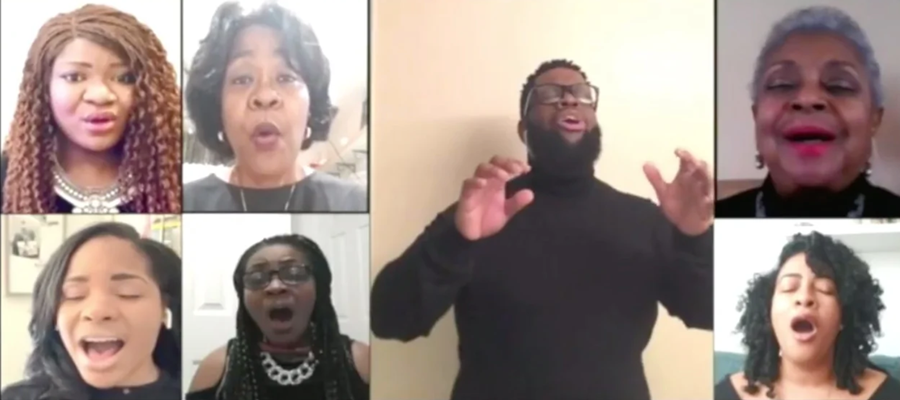
by Adelle M. Banks, RNS | Apr 29, 2020 | Headline News |
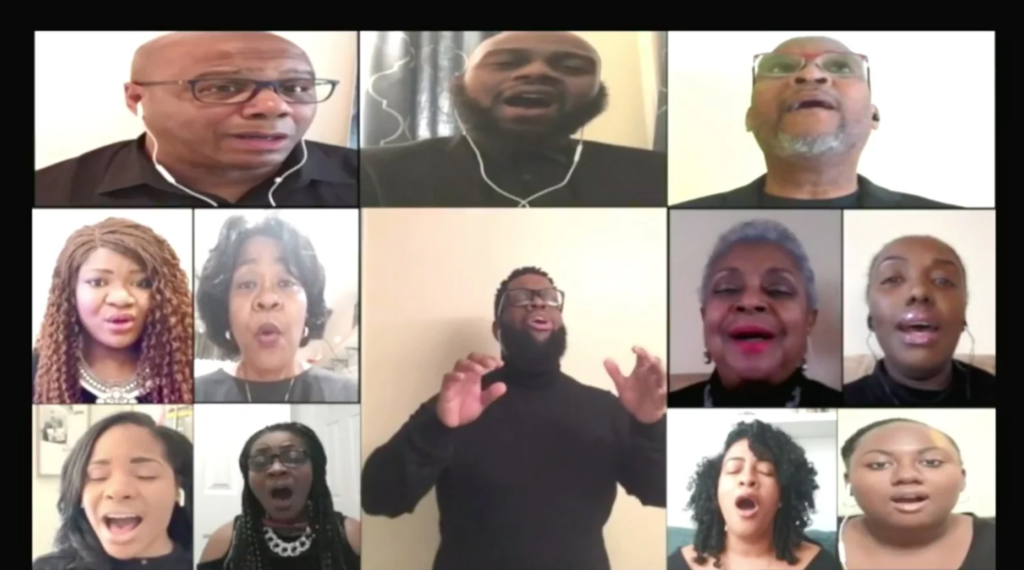
The virtual choir of Grace Baptist Church performs ‘I Am Thine,’ which was included in the April 19, 2020, online service from the Mount Vernon, New York, church. Video screengrab
Top officials of seven black Christian denominations have joined civil rights leaders in calling for people to stay home until it is safe in states whose governors are lifting shelter-in-place orders.
“We regard this pandemic as a grave threat to the health and life of our people, and as a threat to the integrity and vitality of the communities we are privileged to serve,” they wrote in a statement released Friday (April 24). “For these reasons, we encourage all Black churches and businesses to remain closed during this critical period.”
The signatories include leaders of the African Methodist Episcopal Church; African Methodist Episcopal Zion Church; Christian Methodist Episcopal Church; Church of God in Christ; National Baptist Convention of America, International, Inc.; National Baptist Convention, U.S.A. Inc.; and Progressive National Baptist Convention Inc.
Some of those denominations have tallied or been the subject of reports of COVID-19 deaths among their clergy and members.
“The denominations and independent churches represented in this statement, which comprise a combined membership of more than 25 million people and more than 30,000 congregations, intend to remain closed and to continue to worship virtually, with the same dedication and love that we brought to the church,” they added.
The denominational officials and faith leaders, including the Rev. W. Franklyn Richardson of the Conference of National Black Churches and the Rev. Al Sharpton of the National Action Network, joined presidents of the NAACP, the National Urban League and other groups as signatories.
They noted that an April 21 report by the federal Centers for Disease Control and Prevention stated that 20% of the COVID-19 deaths in the United States were of African Americans. In comparison, blacks constitute 13% of the U.S. population.
“Across the country, we see the same disproportionate impact,” they said. “Our families need us. Our communities need us. We must continue to telework wherever possible, and to tele-worship for however long it is necessary to do so.”
The letter comes in the same week the conservative law firm Liberty Counsel has organized a “ReOpen Church Sunday” initiative, encouraging clergy to begin in-person worship again on the weekend of May 3. That Sunday falls in the same week as the annual observance of the National Day of Prayer.
According to The Hill, some governors have never issued stay-at-home orders, others’ mandates are expiring within days, and still, others stated no end date.
Likewise, states have varied widely in their decision to have or not have religious exemptions in their orders about staying at home.
The black church officials and civil rights advocates said they understand some people may believe they need to be involved in public life. The leaders urged those who do to follow precautions about physical distancing and wearing masks.
“We do not take it lightly to encourage members of our communities to defy the orders of state governors,” they added. “But we are compelled by our faith, by our obligation as servants of God, and by our commitment as civil rights leaders, to speak life into our communities. Our sacred duty is to support and advance the life and health of Black people, families, and communities in our country.”
by UrbanFaith Staff | Oct 29, 2012 | Feature, Headline News |

WALKING BY FAITH TO THE POLLS: Dozens af marchers from various churches leave the New Hope Baptist Church in Fort Lauderdale, Florida, on Sunday Oct. 28, 2012, en route to the African American Cultural Library to vote. (Photo: Joe Cavaretta, South Florida Sun Sentinel)
On a day punctuated by echoes of the civil rights movement, hundreds of people poured out of churches after services in South Florida’s historic black neighborhoods Sunday to march to the voting booth, intent on honoring a right for which ancestors shed their blood.
“People have died so I could do this,” said James Gadsen, 74, a deacon at New Hope Baptist Church, the rallying point for the mile-long walk down Sistrunk Boulevard to the polls in the African-American Research Library in Fort Lauderdale. “Too many people have given up too much for me not to go vote.”
In Boynton Beach, scores of parishioners gathered at St. John Missionary Baptist Church and other houses or worship and were bused to various polling sites.
“We do not make an endorsement, but we urge people to consider a candidate who would do what Jesus would require,” said the Rev. Nathaniel Robinson, pastor of Greater St. Paul AME Church, who led his parishioners to the polls in Delray Beach.
Dubbed “Souls to the Polls,” the get-out-the-vote effort on the second day of statewide early voting was sponsored by several churches, local NAACP chapters and several public service sororities and fraternities, including Delta Sigma Theta.
The march reflected the tradition of many black voters casting their ballots after church on the Sunday before Election Day.
This year, however, the eight-day period set aside for early voting — cut from 14 days in the last presidential election — does not include the Sunday before Nov. 6. Early voting ends Saturday.
Many Democrats charged that Republican Gov. Rick Scott and the Republican-controlled Florida Legislature scaled back on early voting for 2012 to suppress the minority vote. Republicans deny that charge.
But those marching Sunday said they did not want to take any chances.
“We need to make sure our voices are heard,” said march organizer and attorney Alfreda Coward of Delta Sigma Theta. “And we need to make sure we elect people who are passionate about the issues that we are passionate about.”
The march and the rally outside the polls were nonpartisan. Both Democratic and Republican candidates were introduced before most marchers got in line to vote.
But there was little doubt which of the presidential nominees most of the marchers backed.
“Four more years,” the crowd chanted as the marchers streamed past Ray’s Meat Market, BG’s Home Cooking, under Interstate 95 and over the New River Bridge on a breezy, sunny day.
Not everyone marching was eligible to vote. Among the many youngsters joining family groups was Isaiah Blackwell, 15, a student at Northeast High School. Walking beside his grandmother, Blackwell said he could sense the historical precedents he had only read about.
“This makes me think of Martin Luther King, Jr. and the battle against segregation,” he said. “We have to vote to succeed as a country.”
Inside the library, Broward County supervisor of elections Brenda Snipes said at mid-afternoon that waiting time to get into one of the 50 voting booths ran from 20 to 60 minutes.
That wait time was down from Saturday, when Broward set a record for a single day of presidential early voting.
“We had 28,000 people vote Saturday,” said Snipes. “That is an exceptional number, shocking. I did not realize that people would turn out the way they did.”
By 4 p.m. Sunday, more than 19,000 had cast ballots in Broward County, according to county election officials.
The count of first-day early voters in Palm Beach County on Saturday was more than 13,200, according to elections office spokeswoman Erin Lewandowski. Numbers from Sunday were unavailable.
Whether Sunday’s effort will make up for the loss of early-voting days remains to be seen. But this campaign in South Florida, along with other faith-based efforts in cities like Pensacola, Tampa, Orlando, Kissimmee, and Gainesville, will give Florida residents a chance to try.
© 2012 the Sun Sentinel (Fort Lauderdale, FL). Distributed by MCT Information Services. Used by arrangement with Newscom.




 Summer is in full swing, and people all across the country have fired up their grills, purchased their summer wardrobes, and started traveling. For Black folks, summer often means family reunions (especially after the pandemic lockdown), barbecues (cookouts/kickbacks/get-togethers/BBQs), and finding things for the kids to do (like sports, activities, or playing outside). We all look forward to summer vacations, summer hours, and summer…denominational general conferences?
Summer is in full swing, and people all across the country have fired up their grills, purchased their summer wardrobes, and started traveling. For Black folks, summer often means family reunions (especially after the pandemic lockdown), barbecues (cookouts/kickbacks/get-togethers/BBQs), and finding things for the kids to do (like sports, activities, or playing outside). We all look forward to summer vacations, summer hours, and summer…denominational general conferences? Well, we are actually doing
Well, we are actually doing 



